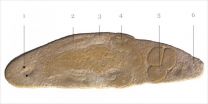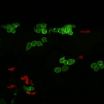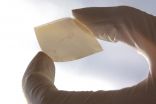The bizarre mating habits of flatworms
2015-07-01
(Press-News.org) Failing to find a mating partner is a dent to the reproductive prospects of any animal, but in the flatworm species Macrostomum hystrix it might involve a real headache. Zoologists from the Universities of Basel and Bielefeld have discovered the extraordinary lengths to which this animal is willing to go in order to reproduce - including apparently injecting sperm directly into their own heads. The academic journal Proceedings of the Royal Society B has published their findings.
The absence of a mate usually spells disaster for sexually reproducing animals. However, some simultaneous hermaphrodites - animals who have both male and female sex organs at the same time - have developed an escape route for this scenario: self-fertilization. It is an imperfect solution, as any offspring produced by so-called "selfing" are bound to be inbred, but still better than not reproducing at all.
In previous studies, it had been established that the flatworm species Macrostomum hystrix is capable of switching to just such selfing behavior when isolated from mating partners, a behavior found in many but not all simultaneous hermaphrodites. In their new study, Dr. Lukas Schärer from the University of Basel and his team now show the bizarre, yet remarkable mechanisms Macrostomum hystrix has developed that make this possible.
A shot to the head
The studied flatworms are highly transparent and their insides can therefore be easily observed under the microscope. By doing so, the zoologists discovered that under selfing conditions, when hermaphroditic individuals had to use their own sperm to fertilize their own eggs, the worms had very few sperm in their tail region. This is in stark contrast to worms kept in a group, which contained most sperm in their tails, close to where fertilization actually occurs. Instead, isolated worms had more sperm in their head region.
This implies a rather strange insemination route: by using its needle-like male copulatory organ, an isolated worm can self-inject sperm into its own anterior body, from where the sperm then moves through the body towards the eggs. "As far as we know, this is the first described example of hypodermic self-injection of sperm into the head. To us this sounds traumatic, but to these flatworms it may be their best bet if they cannot find a mate but still want to reproduce" explains Dr. Steven Ramm, first-author of the study.
Such a convoluted route is likely needed because, although hermaphrodites, there are no internal connections between the worm's male and female reproductive systems.
INFORMATION:
Original source
Ramm SA, Schlatter A, Poirier M, Schärer L (2015)
Hypodermic Self-Insemination as a Reproductive Assurance Strategy
Proceedings of the Royal Society B | doi:10.1098/rspb.2015.0660
[Attachments] See images for this press release:

ELSE PRESS RELEASES FROM THIS DATE:
2015-07-01
Atoms absorb and emit light of various wavelengths. Physicists have long known that there are some tiny changes, or shifts, in the light that gets absorbed or emitted, due to the properties of the atomic nucleus. Now, a team of scientists has elucidated the so-called hyperfine structure of cadmium atoms. Relying on a method called laser spectroscopy, they have measured variations in the energy transition within cadmium atom - Cd in the periodic table. They studied a chain of isotopes with an odd number of neutrons ranging from 59 in 107Cd to 75 in 123Cd. From these high-precision ...
2015-07-01
A good night's sleep has long been recommended to those who have experienced a traumatic event. But an Oxford University-led study provides preliminary experimental work suggesting it could actually be the wrong thing to do.
The research, conducted in Oxford's Wellcome Trust-funded Sleep and Circadian Neuroscience Institute (SCNi) and published in the journal Sleep, showed that sleep deprivation might prevent people from consolidating memories of experimental trauma (emotional film clips in the study), reducing their tendency to experience flashbacks.
Dr Kate Porcheret, ...
2015-07-01
(SACRAMENTO, Calif.) -- Soldiers injured during the conflicts in Iraq and Afghanistan have the highest survival rates in history, thanks to the availability of surgeons skilled in combat care. But combat-ready surgical skills are hard to sustain off the battlefield.
"A lot of knowledge builds up in the military medical enterprise during times of war," said Joseph Galante, who chairs the UC Davis Division of Trauma, Emergency and Critical Care Surgery and is a commander in the U.S. Navy Reserves. "When peacetime comes, that knowledge can slide. We need to identify ways ...
2015-07-01
The global supply of seafood is set to change substantially and many people will not be able to enjoy the same quantity and dishes in the future due to climate change and ocean acidification, according to UBC scientists.
These findings were released today in Japan by the Nereus program, an international research team led by UBC scientists and supported by the Nippon Foundation. The Nereus program was formed to study the future of the world's oceans and seafood resources. Today it released a summary of the first phase of its research in a report titled 'Predicting Future ...
2015-07-01
ASCO Perspective: Gary Schwartz, MD, ASCO Expert "This study adds to the growing discussion around food and cancer risk. While the findings are intriguing, it's far too soon to recommend any broad changes to grapefruit or orange consumption. Until conclusive data are available, we should continue to be cautious about protecting our skin from sun exposure."
A new analysis of dietary patterns among more than 100,000 Americans suggests that frequent consumption of citrus -- namely whole grapefruit and orange juice -- may be associated with an increased risk of melanoma. ...
2015-07-01
July 1 -- Researchers in the United Kingdom and Denmark have studied the "see-through" larvae of zebrafish to reveal how wound healing leads to skin cancer. Live imaging shows neutrophils, the protective inflammatory cells of the body's immune system, diverted from an induced wound to any nearby precancerous skin cells. The newly arrived neutrophils cause rapid division of these skin cells, which may cause them to progress to melanoma. The results are published in The EMBO Journal.
"Our results provide direct visual evidence of a physical link between wound-associated ...
2015-07-01
Scientists from the University of Leeds and The Institute of Cancer Research, London, have discovered a new protein which triggers the growth of blood vessels in breast cancer tumours which have spread to the brain, a common location which breast cancer can spread to.
Dr Georgia Mavria's team in the School of Medicine at Leeds found that by withholding the DOCK4 protein in mouse models, a particular part of the blood vessel did not form as quickly, meaning tumours grew at a slower rate.
Dr Mavria said: "We want to understand how these tumours form and grow, but we still ...
2015-07-01
Storing solar energy as hydrogen is a promising way for developing comprehensive renewable energy systems. To accomplish this, traditional solar panels can be used to generate an electrical current that splits water molecules into oxygen and hydrogen, the latter being considered a form of solar fuel. However, the cost of producing efficient solar panels makes water-splitting technologies too expensive to commercialize. EPFL scientists have now developed a simple, unconventional method to fabricate high-quality, efficient solar panels for direct solar hydrogen production ...
2015-07-01
Nine times more job offers after training
Eases anxiety and boosts rapport with interviewer
High unemployment for vets with PTSD and mentally ill
CHICAGO --- Finding a job is difficult for veterans with posttraumatic stress disorder (PTSD) and individuals with severe mental illness, who have high unemployment rates even though many want to work.
The job interview -- especially hard for those with mental illness -- can be a major hurdle.
A virtual human -- based on software originally used to train FBI agents -- helped vets with PTSD and individuals with severe ...
2015-07-01
This news release is available in French.
Regular, structured extracurricular sports seem to help kids develop the discipline they need in order to engage effectively in the classroom, according to a new study led by Linda Pagani of the University of Montreal and its affiliated CHU Sainte-Justine children's hospital. "We worked with information provided by parents and teachers to compare kindergarteners' activities with their classroom engagement as they grew up," Pagani said. "By time they reached the fourth grade, kids who played structured sports were identifiably ...
LAST 30 PRESS RELEASES:
[Press-News.org] The bizarre mating habits of flatworms




